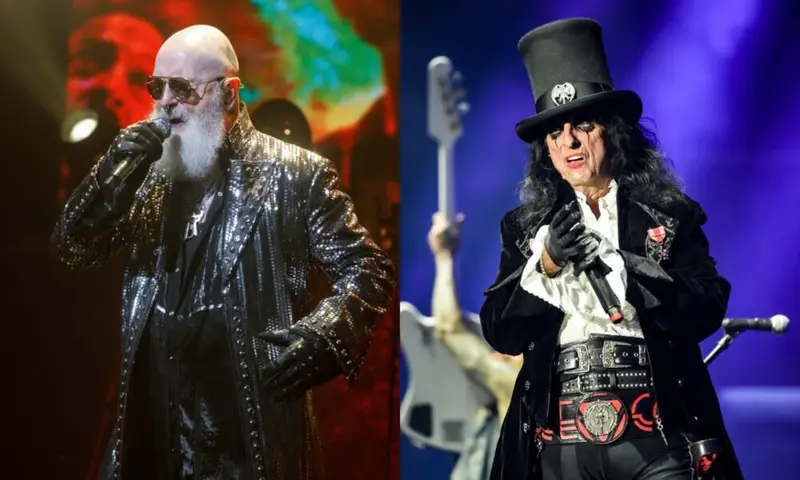Blog
Why Alice Cooper Deserves a VMA Award In 2025
Alice Cooper, the legendary godfather of shock rock, stands as a towering influence in the evolution of music videos and live performance. Despite never having won an MTV Video Music Award, the time has come for his immense contributions to be recognized. In 2025, awarding Alice Cooper a VMA would not only honor his trailblazing work in blending music and theatrics but also acknowledge his foundational role in the art of music video storytelling.
Long before MTV even existed, Alice Cooper was producing visually gripping, theatrical performances that played out like mini horror films on stage. These spectacles weren’t just concerts—they were rock operas filled with dark drama, elaborate props, and macabre storytelling. In many ways, Cooper was crafting music videos live, creating a template that countless artists would later adopt once the music video era exploded in the 1980s.
Cooper’s work inspired generations of musicians to think beyond sound and into the realm of visual artistry. His early music videos, including classics like “Poison” and “Clones (We’re All),” showcased bold visual direction that was decades ahead of its time. With horror-inspired imagery, twisted romanticism, and provocative aesthetics, his videos matched the intensity of his songs and added layers of meaning for fans to unpack.
His influence on modern visual storytelling in music cannot be overstated. Artists such as Marilyn Manson, Lady Gaga, Rob Zombie, and even Billie Eilish have credited Alice Cooper with influencing their visual style and live performances. From his gothic theatrics to his ability to challenge societal norms through shocking imagery, Cooper laid the groundwork for music videos that are now praised for pushing boundaries.
Awarding Alice Cooper a VMA in 2025 would also be a celebration of endurance and innovation. Over the course of a career spanning more than five decades, Cooper has remained relevant by evolving with the times while still preserving his unique identity. He’s never chased trends but rather influenced them, making his mark felt across multiple musical generations.
The VMA’s Video Vanguard Award in particular is designed to honor artists who have made a profound impact on the form and culture of music videos. Alice Cooper fits that description perfectly. While the award has gone to icons like Madonna, Beyoncé, and Missy Elliott, it has yet to be awarded to a figure whose legacy helped define the very concept of visual performance in rock music.
His iconic use of makeup, elaborate costumes, and narrative arcs in both stage and video work paved the way for the “visual album” and music video storytelling that artists today rely on for commercial and artistic expression. Cooper showed the music world that shock, drama, and narrative could coexist with musical excellence.
It’s not just the shock value that deserves recognition, but the artistry behind it. Alice Cooper used horror not just for scares but for satire, using exaggerated characters and grotesque imagery to make commentary on politics, media, and morality. That level of layered storytelling is what the best music videos aspire to achieve.
In recent years, Cooper has continued to embrace the music video format. His more recent releases include well-produced videos that combine digital innovation with classic Cooper theatrics. These visuals demonstrate that even in his seventies, he’s not only active but still evolving, experimenting, and engaging with the medium.
Fans, critics, and fellow artists alike would agree that a VMA in 2025 would serve as long-overdue recognition. It would bridge generations of music lovers—those who remember the shockwaves he sent through rock in the ’70s and those who now see his legacy reflected in their favorite contemporary artists.
The VMA stage would be the perfect platform to revisit and honor his most iconic visuals. Imagine a tribute performance that recreates his unforgettable guillotine act, his signature snake routine, or the eerie set designs from his “Welcome to My Nightmare” tour. It would be both a celebration of music history and a reminder of how influential his work remains.
There’s also something deeply poetic about acknowledging Alice Cooper at a time when rock is experiencing a creative resurgence. Bands like Ghost, The Warning, and others who blend visual drama with hard-hitting music owe a stylistic debt to Cooper’s vision. His legacy lives on, and honoring him now connects the roots of rock to its vibrant present.
In an era where image and branding often overpower artistry, Cooper remains a rare example of someone whose visuals always served a larger creative purpose. He didn’t dress up for attention—he built entire worlds. Every costume, every music video, every theatrical gesture was in service of storytelling, something that the VMA institution has historically celebrated.
MTV and the VMA brand pride themselves on celebrating innovation, rebellion, and cultural impact. Alice Cooper embodies all three. From redefining what it means to perform to challenging norms with every release, he brought theater to rock and laid the foundation for music video artistry before there was a name for it.
A 2025 VMA would also provide a new generation of fans with a gateway to discover Cooper’s catalog. It would introduce young audiences to the depth, artistry, and sheer spectacle of his work, reinforcing the value of performance and narrative in music.
The cultural value of honoring such a pioneer cannot be overstated. It sends a message that the VMA stage is not just for current chart-toppers but for those who shaped the entire visual language of music. It would be a moment of unity between past, present, and future.
Such an award would also give fans and peers the opportunity to express their gratitude for decades of creative inspiration. Cooper has not only entertained millions but challenged artists to think differently, act boldly, and embrace the power of vision in music.
Whether it’s his iconic top hat, his theatrical death scenes, or his commitment to building a character that fans could believe in, Alice Cooper has done more than entertain—he’s transformed how music is seen. He made performance an experience.
In 2025, the VMAs have the chance to do something truly historic by awarding Alice Cooper. Not just for one video, but for a lifetime of vision that made music more than sound—it made it visual, dramatic, and unforgettable.
Judas Priest and Alice Cooper Announce a 22-Date Co-Headline

Alice Cooper and Judas Priest will embark on a 22-date North American co-headline tour this autumn, beginning September 16 in Biloxi, Mississippi and ending October 26 in Houston. On the majority of dates, metal band Corrosion of Conformity serves as support.
Artist presales begin on Wednesday, April 16, with general onsale starting Friday at 10 a.m. local time. Live Nation produces the tour.
Judas Priest, led by powerful leader Rob Halford, just completed the second leg of its “Invincible Shield Tour” and released its famous 19th studio album. According to Pollstar boxoffice data from the fall, the YouTube Theatre in Los Angeles sold out with 5,481 tickets sold. Wasserman Music represents Judas Priest.
Alice Cooper, the American shock rock legend, is poised to conclude his “Too Close For Comfort” tour this summer, promoting his most recent album, Road, and promising an all-new show for the upcoming tour. Alice Cooper is represented by CAA.
Tour Dates:
Tuesday, September 16 – Biloxi, MS – Mississippi Coast Coliseum.
Thu, September 18 – Alpharetta, GA – Ameris Bank Amphitheatre*
Sat, September 20 – Charlotte, NC – PNC Music Pavilion
Sun, September 21 – Franklin, TN – FirstBank Amphitheatre
Wednesday, September 24 – Virginia Beach, VA – Veterans United Home Loans Amphitheatre
Friday, September 26 – Holmdel, NJ – PNC Bank Arts Centre
Saturday, September 27 – Saratoga Springs, NY – Broadview Stage at SPAC
Monday, September 29 – Toronto, ON – Budweiser Stage
Wednesday, October 1 – Burgettstown, PA – The Pavilion at Star Lake.
Thursday, October 02 – Clarkston, MI – Pine Knob Music Theatre
Sat, October 4 – Cincinnati, OH – Riverbend Music Centre
Sun, October 5 – Tinley Park, IL – Credit Union 1 Amphitheatre
Friday, October 10 – Colorado Springs, CO – Broadmoor World Arena
Sunday, October 12 – Salt Lake City, Utah – Utah First Credit Union Amphitheatre
Tuesday, October 14 – Mountain View, CA – Shoreline Amphitheatre.
Wed, October 15 – Wheatland, CA – Toyota Amphitheatre
Saturday, October 18 – Chula Vista, California – North Island Credit Union Amphitheatre
Sun, October 19 – Los Angeles, California – KIA Forum
Wed Oct 22 – Phoenix, AZ – Talking Stick Resort Amphitheatre
Thursday, October 23 – Albuquerque, NM – Isleta Amphitheatre
Saturday, October 25 – Austin, Texas – Germania Insurance Amphitheatre
Sunday, October 26 – Houston, TX – The Cynthia Woods Mitchell Pavilion
*Without help from Corrosion of Conformity.
Netflix Sets Premiere for Revealing Alice Cooper Documentary Exploring His Childhood, Fears, Stage Persona, and Personal Life
Netflix has officially confirmed the premiere date for a highly anticipated documentary series chronicling the extraordinary life and career of rock legend Alice Cooper. This multi-episode production promises to give viewers a never-before-seen look into the man behind the makeup, unraveling the complexities of his childhood struggles, internal fears, on-stage transformation, and deeply personal aspects of his private life, including his views on sex, fame, and identity.
This documentary is expected to explore Alice Cooper’s evolution from a shy, asthmatic child named Vincent Furnier into the trailblazing godfather of shock rock. Long-time fans and newcomers alike will gain fresh insight into how the trials of his youth shaped the dramatic and theatrical persona that millions around the world have come to know.
The series goes deep into his upbringing in a devout Christian household, where conflicting ideals about sin and performance created the internal tension that would later become a recurring theme in his music. Cooper’s early health issues and social anxieties will be addressed, offering a human perspective that contrasts sharply with his explosive, controversial stage image.
Interviews with Cooper, his family, and longtime collaborators will give authenticity and emotional weight to the narrative. This is not merely a celebration of a rock icon but an honest exploration of how trauma, creativity, and resilience collided to create one of music’s most fascinating careers.
Much of the documentary will focus on Cooper’s groundbreaking stagecraft—the guillotines, snakes, electric chairs, and elaborate horror-themed theatrics that shocked and thrilled audiences in equal measure. Viewers will learn how many of these choices were influenced by the nightmares and insecurities he carried from childhood into adulthood.
The documentary won’t shy away from more controversial aspects of Cooper’s journey. It is set to candidly address his battle with alcoholism and how his addiction nearly derailed his life and career. His road to sobriety, supported by his wife Sheryl and renewed religious faith, will be presented as a critical turning point in his story.
Fans will also be surprised to find the series delving into Cooper’s views and experiences regarding sex and relationships. While never considered overtly sexual in his music, Cooper has long drawn inspiration from taboo and provocation, using eroticism as part of his broader critique of fame, identity, and performance culture.
Netflix’s creative team has promised an unfiltered, artistic portrayal of Alice Cooper that blurs the line between the man and the myth. Archival footage, personal journals, and previously unreleased backstage moments will bring new texture to a figure often misunderstood by mainstream audiences.
The series also aims to shed light on Cooper’s influence on generations of musicians—from heavy metal titans to pop artists who embraced spectacle. Commentary from peers like Ozzy Osbourne, Marilyn Manson, and Rob Zombie will contextualize just how deep Cooper’s impact runs through the music world.
What sets this documentary apart is its focus on vulnerability. Beyond the leather, makeup, and monstrous stage antics lies a man who has battled inner demons, loss, and reinvention. The series will chart his spiritual journey, highlighting the ways his faith has helped ground him through decades of chaos and public scrutiny.
Cooper’s marriage to Sheryl Goddard will also be explored, showcasing a rare example of enduring love in the rock-and-roll world. Their 50-year relationship defies industry norms and will be celebrated as a pillar of strength amid the turbulence of fame.
The series includes moments of levity, with Cooper sharing anecdotes from the road, friendships with icons like Keith Moon and Salvador Dalí, and the humorous side of being a global rock star with a deep love for golf and classic horror films.
Netflix’s creative team has described the tone of the series as intimate, cinematic, and occasionally surreal—mirroring the world Cooper built on stage. The visual language of the documentary will reflect his theatrical flair while keeping the emotional tone grounded and sincere.
In addition to the drama and spectacle, the documentary will feature rare acoustic performances and stripped-back musical moments that highlight Cooper’s skills as a songwriter, not just a showman. These intimate sequences aim to reveal the soul behind the spectacle.
One episode will focus on how Cooper reconciled his wild stage persona with his off-stage humility and strong moral compass. Friends and collaborators describe him as gentle, gracious, and generous—traits that contrast sharply with his devilish on-stage antics.
The documentary will also examine the public’s evolving perception of Alice Cooper. Once viewed as a dangerous influence on youth, he is now seen as a rock elder statesman and cultural pioneer who helped redefine entertainment norms.
The series will premiere with a global release, ensuring fans worldwide can engage with the story at the same time. Netflix is banking on Cooper’s cross-generational appeal and the continued interest in legacy rock icons to drive strong viewership numbers.
As the promotional campaign gears up, anticipation is high among fans and music historians alike. Alice Cooper’s story has all the elements of a great drama—struggle, transformation, rebellion, redemption—and the Netflix format allows for a deeper, more nuanced dive than ever before.
Ultimately, this documentary offers more than just a biography. It’s a meditation on identity, performance, and the endurance of artistry over time. By spotlighting Alice Cooper’s personal battles and victories, Netflix is giving audiences a raw and riveting look at what it truly means to become—and survive being—a legend.
Alice Cooper Says Performing Still Fuels Him at 77: ‘It Never Gets Old’
At an age when many artists have long since retired from the stage, rock icon Alice Cooper remains unstoppable. At 77, the Godfather of Shock Rock is still thrilling fans around the world, and he says the energy he gets from performing has never waned. For Cooper, the stage is where he truly comes alive.
Touring for decades might sound exhausting to most, but for Cooper, it’s second nature. He attributes his longevity to a genuine love of the craft. He doesn’t view touring as a job, but as a lifestyle—one that continues to give him purpose and adrenaline night after night.
Alice Cooper is not simply going through the motions. He maintains a rigorous touring schedule, delivering full theatrical performances complete with costumes, props, and a band that brings his iconic music to life. He insists the rush of hearing the crowd, the lights, and the roar of the guitars keeps him young at heart.
In interviews, Cooper has often remarked that he feels most at home on stage. While many artists might burn out or grow bored after decades of performing, he says he still looks forward to every show. It’s a place of comfort, excitement, and constant reinvention for the veteran rocker.
Staying active at 77 is no small feat. Cooper credits his health and vitality to a combination of discipline, routine, and passion. He doesn’t drink or use drugs and keeps himself in great shape, which he says allows him to give the audience the kind of high-energy performances they’ve come to expect.
Part of what keeps him going is the crowd’s enthusiasm. Cooper says fans of all ages—from those who saw him in the ’70s to younger generations discovering his music now—bring an energy that motivates him to keep delivering his best. The intergenerational appeal of his music is something he deeply values.
The theatrical aspect of his shows also keeps things fresh. Alice Cooper has long been known for incorporating elaborate storytelling into his concerts, often with horror-themed visuals, wild characters, and staged scenarios that rival Broadway productions in creativity. This constant evolution helps keep the experience exciting for both him and his fans.
Cooper isn’t just doing nostalgia tours. While he embraces the classics, he also continues to produce new music. His latest work proves he still has creative fire, blending his signature sound with contemporary influences while maintaining the authenticity that defines his career.
One of Cooper’s most notable qualities is his gratitude. He frequently expresses how fortunate he feels to still be touring, recording, and connecting with audiences. In an industry that can be unforgiving, his humility and appreciation for his fans are a big part of his enduring appeal.
For Alice, retirement is not a word he’s eager to consider. While he acknowledges the realities of aging, he also believes that passion can push boundaries. As long as his voice is strong and his body holds up, he intends to keep rocking stages around the world.
His band plays a huge role in his energy. Surrounding himself with younger, equally passionate musicians has created a dynamic synergy on stage. Cooper says they challenge and inspire him, and their mutual respect drives the performance quality to new heights.
Being a mentor to younger musicians is something Cooper takes seriously. He’s often spoken about the importance of encouraging new talent and maintaining the spirit of rock and roll. His longevity serves as a beacon for artists looking to build sustainable careers in music.
Fans who attend his concerts often leave in awe of how vibrant he remains. Many are surprised to see the same theatricality and intensity that defined his shows decades ago still alive and well today. It’s a testament to his enduring work ethic and commitment to giving people a true rock spectacle.
Cooper’s love of performing is not only personal but deeply professional. He sees it as a calling, something he was meant to do. He treats each performance as if it were his last, giving every ounce of himself to the show—a quality that keeps fans coming back for more.
While others his age are settling down, Cooper is planning future tours. His schedule remains full, with international dates, festival appearances, and solo headliners all on the horizon. He shows no signs of slowing, and that alone is awe-inspiring.
Alice Cooper also plays an important role in maintaining rock’s cultural heritage. His music, performances, and persona are rooted in a pivotal time in rock history, and by staying active, he keeps that era relevant and alive for audiences old and new.
Though he’s known for his dark, macabre stage persona, offstage Cooper is warm, witty, and deeply philosophical. He’s spoken candidly about his past struggles and how music helped him overcome personal demons, which adds a layer of authenticity to his performances.
The legend of Alice Cooper has only grown stronger with time. Rather than fading into obscurity, he’s managed to maintain his relevance through reinvention, dedication, and a timeless connection with his fans. Few performers can claim such a feat, especially into their late 70s.
He continues to inspire not just through his music, but by proving that age doesn’t have to mean irrelevance or retreat. In an industry often dominated by youth, Alice Cooper stands as proof that passion, discipline, and genuine love for the art can sustain a performer far beyond the expected timeline.
Ultimately, Alice Cooper’s story is not just one of survival, but of sustained greatness. His refusal to slow down, his devotion to his craft, and his ability to adapt while staying true to himself make him one of rock’s most enduring figures. As long as the lights go up and the crowd roars, Alice Cooper will be there—still performing, still thrilling, and still proving that rock and roll doesn’t retire.
-

 Blog3 days ago
Blog3 days agoCeltic issues a fiery VAR statement after Trusty’s red card appeal is dismissed, as furious chiefs release referee audio publicly.
-

 Blog2 weeks ago
Blog2 weeks agoCeltic informed their January signing under Martin O’Neill that he wouldn’t play a single minute this season.
-

 Blog3 days ago
Blog3 days agoCeltic issued an £83 million warning amid looming UEFA threats.
-

 Blog9 months ago
Blog9 months ago“Courtside to Aisle-Side: Tyrese Haliburton and Jade Jones Set New Wedding Date”
-

 Blog6 days ago
Blog6 days ago£6m star is looking to leave Rangers this summer and has already announced his next club publicly.
-

 Blog5 days ago
Blog5 days agoAuston Trusty under intense Celtic red card investigation amid new Hibs ‘punch’ claims and Rangers’ appeal review.
-

 Blog2 weeks ago
Blog2 weeks agoKyogo perceives Celtic’s transfer veto as a fresh insult as the striker is overlooked by Birmingham’s new boss.
-

 Blog9 months ago
Blog9 months agoPat Kelsey sends a strong three-word fiery message to the Louisville basketball’s team after their Cardinals 14th win…
